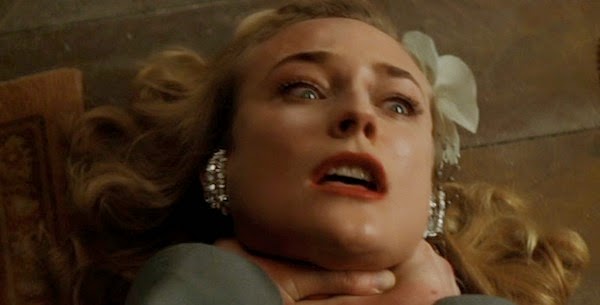Unfortunately, our reading for this week is copyrighted so I can’t post a link to it, but in short it was a fascinating article by Kay Donovan on the subject of ethics in documentaries. Donovan looks at issues such as the representation of the truth, the consent of subjects and the film-maker’s duty of care to those involved.
It was this last point that I found particularly interesting, not just in relation to documentaries but to the film and TV industry in general. A few weeks ago, I was watching a morning show as they discussed the currently showing Fifty Shades of Grey film. Never far from controversy, Fifty Shades was being discussed on this occasion because its two stars, Jamie Dornan and Dakota Johnson, had publicly commented on their discomfort filming some of the raunchier scenes of the film.

The stars of Fifty Shades were understandably uncomfortable filming some of the raunchier scenes. Picture courtesy of the New York News.
To me, this isn’t particularly surprising; just the idea of watching Fifty Shades in the cinema makes me blush a little and so I can’t imagine how uncomfortable it must be to have such a personal experience manufactured and published for a mass audience. But the thing that particularly interested me in the discussions of this particular morning show was when one of the hosts blamed the film-makers, asking the question “in which other workplace would this kind of sexual discomfort be appropriate?”
It’s an interesting question. Obviously, in the interests of a good story the film and TV industry requires its actors to do some crazy things, from sex scenes to shoot-outs to scary stunts. And yet, actors are professionals too, working in a professional environment, so where do we draw the line with what we ask them to do? When does the desire for the perfect shot end and the film-maker’s duty of care begin?
There have been some pretty crazy and controversial cases in the past when film-makers have been criticized for pushing their actors too far. For example, in 2010 it was revealed that on the set of Inglorious Basterds director Quentin Tarantino actually strangled actress Diane Kruger in order to get a realistic reaction from her. Kruger assured fans that she had agreed to the deal, but some were still shocked by Tarantino’s decision and questioned its necessity. Other examples of demanding directors include Werner Herzog filming a documentary on the side of an active volcano and Francis Ford Coppola insisting on filming the entirety of Apocalypse Now in the jungle, leading to Martin Sheen’s heart attack (check out this article from What Culture on 10 of the craziest directors of all time).

Diane Kruger in Inglorious Basterds. Picture courtesy of BlogSpot Blog The Natsad Diaries.
For some of die-hard film fanatics, these struggles are labours of love that are worth the pain; for example, Apocalypse Now is regarded as one of the rawest, grittiest films around that wouldn’t have been the same filmed on an LA sound stage. But were these directors breaching their duty to keep their actors safe? Is putting someone’s safety at risk ever justifiable?

Martin Sheen in the jungle in Apocalypse Now. Picture courtesy of OK Quizzy.
As you can probably tell, we’re straying away from media to ethics in general, which is a complicated issue and one to which we all have different answers. I guess actors all make their own choices and only take on roles that they’re comfortable in, but let’s just say you won’t see me in a Fifty Shades film anytime soon.